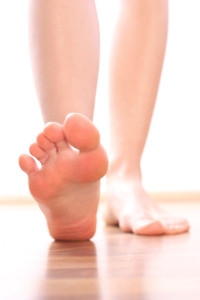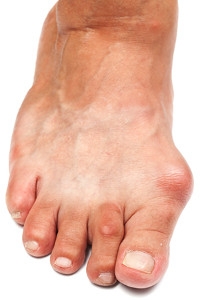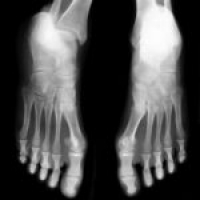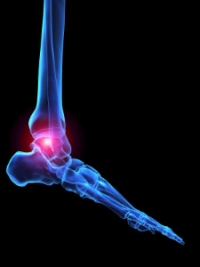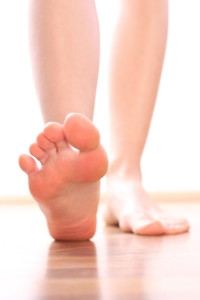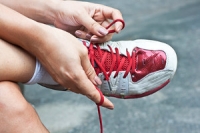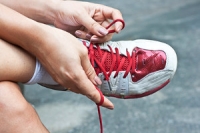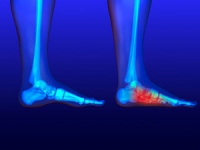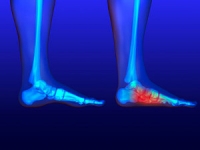
Blog (807)
The Importance of Foot Care
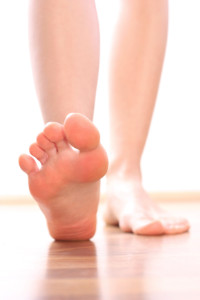 There are many different types of conditions that you may experience in your feet, and they become more noticeable during the summer when you show them off the most. A notoriously famous issue that people experience is toenail fungus. Toenail fungus has the power to make your beautiful toenails become discolored, thick, and brittle. One of the earliest signs of toenail fungus is a white speck near the edge of a nail that spreads to your other nails. Another problematic foot condition may be the development of corns. Corns and calluses are often the result of an excess amount of friction on the feet. They often form on the outside of the small toe and appear as thickened mounds of skin. If you are dealing with toenail fungus or painful corns, you should make an appointment with your podiatrist in order to treat your condition.
There are many different types of conditions that you may experience in your feet, and they become more noticeable during the summer when you show them off the most. A notoriously famous issue that people experience is toenail fungus. Toenail fungus has the power to make your beautiful toenails become discolored, thick, and brittle. One of the earliest signs of toenail fungus is a white speck near the edge of a nail that spreads to your other nails. Another problematic foot condition may be the development of corns. Corns and calluses are often the result of an excess amount of friction on the feet. They often form on the outside of the small toe and appear as thickened mounds of skin. If you are dealing with toenail fungus or painful corns, you should make an appointment with your podiatrist in order to treat your condition.
Everyday foot care is very important to prevent infection and other foot ailments. If you need your feet checked, contact Dr. Kenneth Donovan from Advanced Care Foot and Ankle. Our doctor can provide the care you need to keep you pain-free and on your feet.
Everyday Foot Care
Often, people take care of their bodies, face and hair more so than they do for their feet. But the feet are a very important aspect of our bodies, and one that we should pay more attention to. Without our feet, we would not be able to perform most daily tasks.
It is best to check your feet regularly to make sure there are no new bruises or cuts that you may not have noticed before. For dry feet, moisturizer can easily be a remedy and can be applied as often as necessary to the affected areas. Wearing shoes that fit well can also help you maintain good foot health, as well as making it easier to walk and do daily activities without the stress or pain of ill-fitting shoes, high heels, or even flip flops. Wearing clean socks with closed shoes is important to ensure that sweat and bacteria do not accumulate within the shoe. Clean socks help to prevent Athlete’s foot, fungi problems, bad odors, and can absorb sweat.
If you have any questions please feel free to contact one of our offices located in Warren, Livingston, and Toms River, NJ . We offer the newest diagnostic and treatment technologies for all your foot and ankle needs.
Bunion Therapy
While most people tend to take having pain free feet for granted, people with bunions do not have this privilege. A common myth is that only people of old age develop bunions; this, however, isn’t often true. Approximately 30% of adolescents have developed bunions, and a majority of these bunion sufferers are girls. While footwear is commonly a cause of the deformity, genetics are also capable of playing a role in its development. Bunion treatment depends heavily on the severity of the condition. In mild cases, shoe inserts and wider shoes can be helpful; in severe cases, however, surgery may be needed. Nevertheless, you should have your podiatrist determine the severity of your bunion so that he or she can provide the best route of treatment for you.
If you are suffering from bunions, contact Dr. Kenneth Donovan from Advanced Care Foot and Ankle. Our doctor can provide the care you need to keep you pain-free and on your feet.
What is a Bunion?
A bunion is formed of swollen tissue or an enlargement of boney growth, usually located at the base joint of the toe that connects to the foot. The swelling occurs by the bones in the big toe shifting inward, which impacts the other toes of the foot. This causes the area around the base of the big toe to become inflamed and painful.
Why do Bunions Form?
- Genetics – susceptibility to bunions are often hereditary
- Stress on the feet – poorly fitted and uncomfortable footwear that places stress on feet, such as heels, can cause bunions to form
How are Bunions Diagnosed?
Doctors often perform two tests – blood tests and x-rays – when trying to diagnose bunions, especially in the early stages of development. Blood tests help determine if the foot pain is being caused by something else, such as arthritis, while x-rays provide a clear picture of your bone structure to your doctor.
How are Bunions Treated?
- Refrain from wearing heels or similar shoes that cause discomfort
- Select wider shoes that can provide more comfort and reduce pain
- Anti-inflammatory and pain management drugs
- Orthotics or foot inserts
- Surgery
If you have any questions, please feel free to contact one of our offices located in New Jersey. We offer the newest diagnostic tools and technologies to treat your foot and ankle needs.
How Body Weight May be Linked to Stress Fractures
Studies have shown that women with low body weight are more likely to develop stress fractures. According to a researcher at Ohio State University, “Having too little lean muscle mass to dissipate the impact of repetitive pounding on hard surfaces makes the bones of runners' legs vulnerable to injury.” In order to prevent stress fractures, it is advised that women incorporate resistance training into their workouts in order to strengthen their lower legs.
Activities where too much pressure is put on the feet can cause stress fractures. To learn more, contact Dr. Kenneth Donovan from Advanced Care Foot and Ankle. Our doctor can provide the care you need to keep your pain free and on your feet.
Dealing with Stress Fractures of the Foot and Ankle
Stress fractures occur in the foot and ankle when muscles in these areas weaken from too much or too little use.
The feet and ankles then lose support when walking or running from the impact of the ground. Since there is no protection, the bones receive the full impact of each step. Stress on the feet can cause cracks to form in the bones, thus creating stress fractures.
What Are Stress Fractures?
Stress fractures occur frequently in individuals whose daily activities cause great impact on the feet and ankles. Stress factors are most common among:
- Runners
- People affected with Osteoporosis
- Tennis or basketball players
- Gymnasts
- High impact workouts
Symptoms
Pain from the fractures occur in the area of the fractures and can be constant or intermittent. It will often cause sharp or dull pain with swelling and tenderness. Engaging in any kind of activity which involves high impact will aggravate pain.
If you have any questions please feel free to contact one of our offices located in Warren, Livingston, and Toms River, NJ. We offer the newest diagnostic and treatment technologies for all your foot and ankle needs.
Read more about Dealing with Stress Fractures of the Foot and Ankle
Tips for Arthritic Feet
Adults who have arthritis are likely to experience joint inflammation in their feet. Arthritic symptoms in the feet may include stiffness, limited mobility, or tenderness in the joints. Common ways to treat feet issues caused by arthritis are physical therapy, joint replacement surgery, and exercise. It is crucial for people that have arthritis to exercise so that they do not lose any muscle mass. If common exercises such as walking are too painful, water aerobics and stationary bikes may be used instead.
Arthritis can be a difficult condition to live with. If you are seeking treatment, contact Dr. Kenneth Donovan from Advanced Care Foot and Ankle. Our doctor can provide the care you need to keep you pain-free and on your feet.
Arthritic Foot Care
Arthritis is a joint disorder that involves the inflammation of different joints in your body, such as those in your feet. Arthritis is often caused by a degenerative joint disease and causes mild to severe pain in all affected areas. In addition to this, swelling and stiffness in the affected joints can also be a common symptom of arthritis.
In many cases, wearing ill-fitting shoes can worsen the effects and pain of arthritis. Wearing shoes that have a lower heel and extra room can help your feet feel more comfortable. In cases of rheumatoid arthritis, the arch in your foot may become problematic. Buying shoes with proper arch support that contour to your feet can help immensely.
Alleviating Arthritic Pain
- Exercises that stretch the foot can prevent further pain and injury and increase mobility
- Most of the pain can be alleviated with anti-inflammatory drugs, heat, and topical medications
- Massages can help temporarily alleviate pain.
It is best to see your doctor for the treatment that is right for your needs and symptoms. Conditions vary, and a podiatrist can help you determine the right method of care for your feet.
If you have any questions, please feel free to contact one of our offices located in Warren, Livingston, and Toms River, NJ. We offer the newest diagnostic tools and technology to treat your foot and ankle needs.
What to Look for When Searching for Running Shoes
There are certain features that you should ensure your shoes have before you decide to start running. It is crucial that your shoe has arch support, cushioning, and traction in order to improve your running mechanics. The amount of support that you need in your shoe depends greatly on the arch of your foot. For example, people who have feet with high arches do not need shoes with a lot of support, since these may result in injury for them. It is important that you are aware of what type of foot arch you have so that you can find the perfect running shoe for you. Your podiatrist can help you evaluate your foot arch height as well as other factors that will help determine what running shoe you should purchase.
If you are a runner, wearing the right running shoe is essential. For more information, contact Dr. Kenneth Donovan from Advanced Care Foot and Ankle. Our doctor can provide the care you need to keep you pain-free and on your feet.
Choosing the Right Running Shoe for Your Foot Type
To increase performance and avoid the risk of injury, it is important to choose the right running shoe based on your foot type. The general design of running shoes revolves around pronation, which is how the ankle rolls from outside to inside when the foot strikes the ground.
- Neutral runners are able to choose from a wide variety of shoes, including minimalist shoes or even going barefoot.
- Runners who overpronate, or experience an over-abundance of ankle rolling, should choose shoes that provide extra motion control and stability.
- Runners who underpronate, or supinate, have feet that have high arches and lack flexibility, preventing shock absorption. They require shoes with more flexibility and cushion.
If you have any questions please feel free to contact one of our offices located in Warren, Livingston, and Toms River, NJ. We offer the newest diagnostic and treatment technologies for all your foot and ankle needs.
Read more about Choosing the Right Running Shoe for Your Foot Type
Is your sweat normal?
Hyperhidrosis, a condition that causes an excessive amount of sweat, affects approximately 5% of the population. A woman who suffers from the condition said, “I shower three times a day, wear only black clothes and avoid slip-on shoes, because my feet slide right out of them.” It is no secret that hyperhidrosis has the power to interfere with daily activities, and can be a bit embarrassing to those who have it. The core function of sweat is to cool down the body when its temperature rises due to hormones, physical activity, or our thermoregulatory centers. While normal amounts of sweat are necessary for our bodies to achieve homeostasis, an excessive amount should be treated with the assistance of a medical professional. If you often experience sweaty feet you should speak with a podiatrist.
If you are suffering from hyperhidrosis contact Dr. Kenneth Donovan of Advanced Care Foot and Ankle. Our doctor can provide the care you need to attend to all of your foot and ankle needs.
Hyperhidrosis of the Feet
Hyperhidrosis is a rare disorder that can cause people to have excessive sweating of their feet. This can usually occur all on its own without rigorous activity involved. People who suffer from hyperhidrosis may also experience sweaty palms.
Although it is said that sweating is a healthy process meant to cool down the body temperature and to maintain a proper internal temperature, hyperhidrosis may prove to be a huge hindrance on a person’s everyday life.
Plantar hyperhidrosis is considered to be the main form of hyperhidrosis. Secondary hyperhidrosis can refer to sweating that occurs in areas other than the feet or hands and armpits. Often this may be a sign of it being related to another medical condition such as menopause, hyperthyroidism and even Parkinson’s disease.
In order to alleviate this condition, it is important to see your doctor so that they may prescribe the necessary medications so that you can begin to live a normal life again. If this is left untreated, it is said that it will persist throughout an individual’s life.
A last resort approach would be surgery, but it is best to speak with your doctor to find out what may be the best treatment for you.
If you have any questions please feel free to contact one of our offices located in Warren, Livingston, and Toms River, NJ. We offer the newest diagnostic and treatment technologies for all your foot and ankle needs.
Choosing the Right Shoe for Your Activity
It is important that you choose the right pair of shoes to wear in order to avoid any sort of injury. Wearing the wrong pair can cause you discomfort and aggravate any pre-existing conditions you may have. Depending on what type of activity you are about to partake in, you should research what type of shoe would be the best fit for you. For example if you are going hiking, you should look for a shoe that is stiffer, with a high ankle. If you are going running, you should look for a flexible shoe that has a breathable material. Walking shoes should have good arch support and should be stiffer than a running shoe, although slightly more flexible than a hiking shoe.
Getting the right shoe size is an important part of proper foot health. Seek the assistance of Dr. Kenneth Donovan from Advanced Care Foot and Ankle. Our doctor will provide the care you need to keep you pain-free and on your feet.
Getting the Right Shoe Size
There are many people who wear shoes that are the incorrect size, negatively affecting their feet and posture. Selecting the right shoes is not a difficult process, so long as you keep several things in mind when it comes to choosing the right pair.
- When visiting the shoe store, use the tools available to measure your foot.
- Be sure there is ‘wiggle room’. There should be about an inch between your toes and the tip of your shoes.
- Do not always assume you are the same size, as manufacturers run differently.
- Purchase shoes later in the day, as your feet swell as the day progresses.
- If a shoe is not comfortable, it is not suitable. Most shoes can’t be ‘broken in’, and comfort should be the ultimate goal when it comes to choosing the right pair of shoes
As our feet hold our body weight and keep us moving, it is important to treat them right. Picking the right pair of shoes can provide your feet comfort and mobility without pain.
If you have any questions, please feel free to contact one of our offices located in Warren, Livingston, and Toms River, NJ. We offer the newest diagnostic and treatment technologies for all your foot care needs.
Read more about Getting the Right Shoe Size: To Keep Your Feet Happy
Choosing the Right Shoe for Your Activity
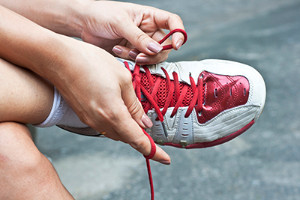 It is important that you choose the right pair of shoes to wear in order to avoid any sort of injury. Wearing the wrong pair can cause you discomfort and aggravate any pre-existing conditions you may have. Depending on what type of activity you are about to partake in, you should research what type of shoe would be the best fit for you. For example if you are going hiking, you should look for a shoe that is stiffer, with a high ankle. If you are going running, you should look for a flexible shoe that has a breathable material. Walking shoes should have good arch support and should be stiffer than a running shoe, although slightly more flexible than a hiking shoe.
It is important that you choose the right pair of shoes to wear in order to avoid any sort of injury. Wearing the wrong pair can cause you discomfort and aggravate any pre-existing conditions you may have. Depending on what type of activity you are about to partake in, you should research what type of shoe would be the best fit for you. For example if you are going hiking, you should look for a shoe that is stiffer, with a high ankle. If you are going running, you should look for a flexible shoe that has a breathable material. Walking shoes should have good arch support and should be stiffer than a running shoe, although slightly more flexible than a hiking shoe.
Getting the right shoe size is an important part of proper foot health. Seek the assistance of Dr. Kenneth Donovan from Advanced Care Foot and Ankle. Our doctor will provide the care you need to keep you pain-free and on your feet.
Getting the Right Shoe Size
There are many people who wear shoes that are the incorrect size, negatively affecting their feet and posture. Selecting the right shoes is not a difficult process, so long as you keep several things in mind when it comes to choosing the right pair.
- When visiting the shoe store, use the tools available to measure your foot.
- Be sure there is ‘wiggle room’. There should be about an inch between your toes and the tip of your shoes.
- Do not always assume you are the same size, as manufacturers run differently.
- Purchase shoes later in the day, as your feet swell as the day progresses.
- If a shoe is not comfortable, it is not suitable. Most shoes can’t be ‘broken in’, and comfort should be the ultimate goal when it comes to choosing the right pair of shoes
As our feet hold our body weight and keep us moving, it is important to treat them right. Picking the right pair of shoes can provide your feet comfort and mobility without pain.
If you have any questions, please feel free to contact one of our offices located in Warren, Livingston, and Toms River, NJ . We offer the newest diagnostic and treatment technologies for all your foot care needs.
Living with Flat Feet
“About 20-30% of the population suffers from fallen arches in one or both feet.” Flat feet can be very problematic for runners. Those with flat feet have to be careful while training, stretching, and selecting running shoes. They have to know and pay attention to the warning signs of potential foot problems. Those with flat feet may also have a condition called plantar fasciitis, however stretching is the best way to prevent onset of this. Having shoes that fit properly is important for everyone, but it is especially important for those who have flat feet.
Flatfoot is a condition many people suffer from. If you have flat feet, contact Dr. Kenneth Donovan from Advanced Care Foot and Ankle. Our doctor will treat your foot and ankle needs.
What Are Flat Feet?
Flatfoot is a condition in which the arch of the foot is depressed and the sole of the foot is almost completely in contact with the ground. About 20-30% of the population generally has flat feet because their arches never formed during growth.
Conditions & Problems:
Having flat feet makes it difficult to run or walk because of the stress placed on the ankles.
Alignment – The general alignment of your legs can be disrupted, because the ankles move inward which can cause major discomfort.
Knees – If you have complications with your knees, flat feet can be a contributor to arthritis in that area.
Symptoms
- Pain around the heel or arch area
- Trouble standing on the tip toe
- Swelling around the inside of the ankle
- Flat look to one or both feet
- Having your shoes feel uneven when worn
Treatment
If you are experiencing pain and stress on the foot you may weaken the posterior tibial tendon, which runs around the inside of the ankle.
If you have any questions please feel free to contact one of our offices located in Warren, Livingston, and Toms River, NJ. We offer the newest diagnostic and treatment technologies for all your foot and ankle needs.
Living with Flat Feet
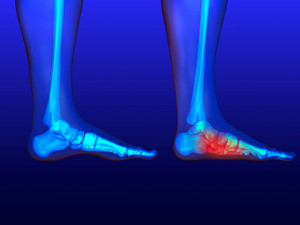 “About 20-30% of the population suffers from fallen arches in one or both feet.” Flat feet can be very problematic for runners. Those with flat feet have to be careful while training, stretching, and selecting running shoes. They have to know and pay attention to the warning signs of potential foot problems. Those with flat feet may also have a condition called plantar fasciitis, however stretching is the best way to prevent onset of this. Having shoes that fit properly is important for everyone, but it is especially important for those who have flat feet.
“About 20-30% of the population suffers from fallen arches in one or both feet.” Flat feet can be very problematic for runners. Those with flat feet have to be careful while training, stretching, and selecting running shoes. They have to know and pay attention to the warning signs of potential foot problems. Those with flat feet may also have a condition called plantar fasciitis, however stretching is the best way to prevent onset of this. Having shoes that fit properly is important for everyone, but it is especially important for those who have flat feet.
Flatfoot is a condition many people suffer from. If you have flat feet, contact Dr. Kenneth Donovan from Advanced Care Foot and Ankle. Our doctor will treat your foot and ankle needs.
What Are Flat Feet?
Flatfoot is a condition in which the arch of the foot is depressed and the sole of the foot is almost completely in contact with the ground. About 20-30% of the population generally has flat feet because their arches never formed during growth.
Conditions & Problems:
Having flat feet makes it difficult to run or walk because of the stress placed on the ankles.
Alignment – The general alignment of your legs can be disrupted, because the ankles move inward which can cause major discomfort.
Knees – If you have complications with your knees, flat feet can be a contributor to arthritis in that area.
Symptoms
- Pain around the heel or arch area
- Trouble standing on the tip toe
- Swelling around the inside of the ankle
- Flat look to one or both feet
- Having your shoes feel uneven when worn
Treatment
If you are experiencing pain and stress on the foot you may weaken the posterior tibial tendon, which runs around the inside of the ankle.
If you have any questions please feel free to contact one of our offices located in Warren, Livingston, and Toms River, NJ . We offer the newest diagnostic and treatment technologies for all your foot and ankle needs.
